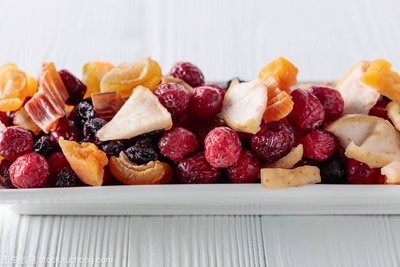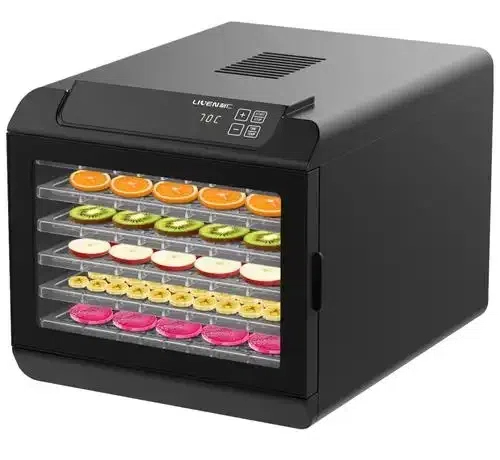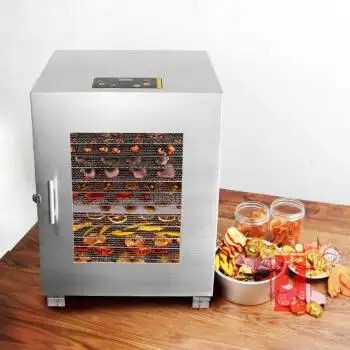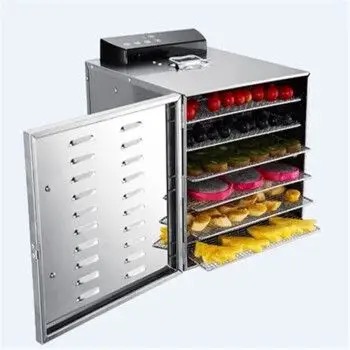
Content Menu
● Introduction
● Understanding Food Drying
● Types of Food Dryers
>> Electric Food Dehydrators
>> Heat Pump Dryers
>> Solar Food Dryers
>> Commercial vs. Home Use
● Choosing the Right Food Dryer
● Applications of Food Drying
>> Drying Fruits and Vegetables
>> Making Jerky
>> Creating Snacks
● Health and Safety Considerations
● Conclusion
● Frequently Asked Questions
>> 1. What is the best food dryer for home use?
>> 2. How long does it take to dry fruits in a dehydrator?
>> 3. Can I dry meat in a food dehydrator?
>> 4. How should I store dried foods?
>> 5. Is it worth investing in a commercial food dehydrator?
Introduction
Food drying is an ancient preservation method that has stood the test of time. It involves removing moisture from food, which inhibits the growth of bacteria, yeasts, and molds. This process not only extends the shelf life of food but also concentrates flavors and nutrients, making dried foods a popular choice for health-conscious consumers. In this article, we will explore the various types of food dryers available, their applications, and how to choose the right one for your needs.

Understanding Food Drying
The science behind food drying is relatively simple. By reducing the moisture content of food to about 20% or less, the growth of spoilage organisms is significantly slowed. This method retains most of the food's nutrients, making dried fruits and vegetables a healthy snack option. Additionally, dried foods are lightweight and easy to store, making them ideal for camping, hiking, and emergency preparedness.
Types of Food Dryers
Electric Food Dehydrators
Electric food dehydrators are the most common type of food dryer. They use a fan and heating element to circulate warm air around the food, effectively removing moisture. These devices come with multiple trays, allowing you to dry various foods simultaneously. They are user-friendly and often come with adjustable temperature settings, making them suitable for a wide range of foods.
Heat Pump Dryers
Heat pump dryers are a more energy-efficient option that uses a heat pump to extract moisture from food. They operate at lower temperatures, which helps preserve the food's nutritional value. These dryers are particularly effective for large-scale operations, such as commercial food processing.
Solar Food Dryers
For those looking for an eco-friendly option, solar food dryers harness the power of the sun to dry food. These devices are simple to use and can be very effective in sunny climates. However, they require more time and careful monitoring to ensure that food dries evenly.
Commercial vs. Home Use
When choosing a food dryer, consider whether you need it for home use or commercial purposes. Commercial food dehydrators are larger and designed for higher volumes, while home models are more compact and user-friendly.

Choosing the Right Food Dryer
When selecting a food dryer, consider the following factors:
1. Capacity: Choose a model that fits your drying needs. Larger families or those who plan to dry food in bulk may require a bigger unit.
2. Energy Efficiency: Look for models with good energy ratings to save on electricity costs.
3. Ease of Use: Some models come with digital controls and timers, making them easier to operate.
Popular brands include Cosori, Excalibur, and Nesco, each offering a range of models to suit different needs.
Applications of Food Drying
Drying Fruits and Vegetables
Dried fruits and vegetables are versatile ingredients that can be used in various dishes. To dry fruits, slice them evenly and consider pre-treating them with lemon juice to prevent browning. Vegetables can be blanched before drying to preserve color and flavor.
Making Jerky
Jerky is a popular snack that can be made at home using a food dehydrator. Choose lean cuts of meat, marinate them for flavor, and slice them thinly before drying. The process typically takes several hours, depending on the thickness of the meat.
Creating Snacks
Dried snacks can be a healthy alternative to processed foods. Consider making your own fruit leather by pureeing fruits and spreading them on dehydrator trays. You can also experiment with drying herbs for use in cooking.
Health and Safety Considerations
Proper food handling and storage are crucial when drying food. Always wash fruits and vegetables thoroughly before drying, and store dried foods in airtight containers to prevent moisture absorption. It's also important to follow guidelines for drying meats to ensure they are safe to eat.
Conclusion
Food drying is a valuable skill that can enhance your culinary repertoire while promoting sustainability. By understanding the different types of food dryers and their applications, you can make informed choices that suit your lifestyle. Whether you're looking to preserve seasonal produce or create healthy snacks, food drying offers a world of possibilities.

Frequently Asked Questions
1. What is the best food dryer for home use?
The best food dryer for home use depends on your needs, but popular options include the Cosori and Excalibur models, which offer good capacity and features.
2. How long does it take to dry fruits in a dehydrator?
Drying times vary by fruit and thickness, but most fruits take between 6 to 12 hours to dry completely.
3. Can I dry meat in a food dehydrator?
Yes, you can dry meat in a food dehydrator. Ensure it is sliced thinly and marinated for flavor, and follow safe drying practices.
4. How should I store dried foods?
Store dried foods in airtight containers in a cool, dark place to maintain freshness and prevent moisture absorption.
5. Is it worth investing in a commercial food dehydrator?
If you plan to dry large quantities of food regularly, a commercial food dehydrator can be a worthwhile investment due to its efficiency and capacity.












